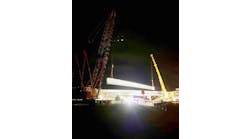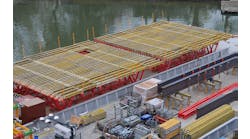The nearly 48,000-mile Interstate Highway System literally moves the U.S. economy. It carries 75% of the nation’s heavy truck traffic. A new report by the American Road and Transportation Builders Association (ARTBA) finds there is the equivalent of one “structurally deficient”-rated bridge, on average, for every 27 miles of our major highway network. The 1,800 structurally deficient interstate bridges are crossed 60 million times daily.
When it comes to bridges needing attention, however, that’s just the tip of the iceberg.
According to an analysis of the U.S. DOT’s just released 2017 National Bridge Inventory database, 54,259 of the nation’s bridges are rated structurally deficient. If placed end-to-end, they would stretch 1,216 miles, or nearly the distance between Miami and New York City.
Cars, trucks and school buses cross these 54,259 compromised structures 175 million times every day, the data show.
The pace of improving the nation’s inventory of structurally deficient bridges slowed this past year. It’s down only two-tenths of a percent from the number reported in the government’s 2016 data. At current pace of repair or replacement, it would take 37 years to remedy all of them, said Dr. Alison Premo Black, chief economist for ARTBA.
Noting President Trump is expected to address the nation’s infrastructure challenges in his Jan. 30 “State of the Union” address, Black said, “An infrastructure package aimed at modernizing the Interstate System would have both short- and long-term positive effects on the U.S. economy.” Traffic bottlenecks, she said, costs the trucking industry alone over $60 billion per year in lost productivity and fuel, which “increases the cost of everything we make, buy or export.”
Other key findings in the ARTBA analysis include:
- Iowa (5,067), Pennsylvania (4,173), Oklahoma (3,234), Missouri (3,086), Illinois (2,303), Nebraska (2,258), Kansas (2,115), Mississippi (2,008), North Carolina (1,854) and New York (1,834) have the most structurally deficient bridges;
- The District of Columbia (8), Nevada (31), Delaware (39), Hawaii (66) and Utah (87) have the fewest;
- At least 15% of the bridges in six states—Rhode Island (23%), Iowa (21%), West Virginia (19%), South Dakota (19%), Pennsylvania (18%) and Nebraska (15%)—fall in the structurally deficient category.
State and congressional district specific information from the analysis—including rankings and the locations of the 250 most heavily travelled structurally deficient bridges in the nation and top 25 most heavily traveled in each state—is available at www.artbabridgereport.org.



